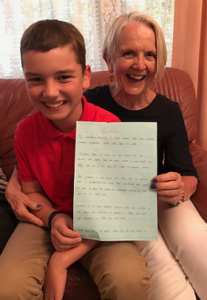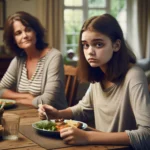A grandson’s letter: Breaking the inter-generational power of an eating disorder
A grandson’s letter: Breaking the inter-generational power of an eating disorder

A one-page hand-written letter from a grandson this festive season has a special place in my diary and heart forever. Lachlan, 11, is yet to fully understand the illness that wreaked havoc on my life, that of his great grandparents, grandparents and mother, and extended families, but his insightful letter adds to the evidence on why we must never give up on a person who has an eating disorder.
Lachlan’s letter, gift-wrapped, was inconspicuously placed under the Christmas tree along with a small mountain of other presents to be exchanged among the three generations of my 17-member family. When I opened his gift, the unwrapping of other gifts from under the tree paused, while family members gathered around to listen while eight-year-old Olivia read out loud her brother’s words. This is Lachlan’s letter:
GRANDMA
My Grandma, June, is a great author who has written several different books and likes to cook.
Grandma likes to cook in her spare time for herself and others. She has even written a cook book my Mum still uses to this day. She makes an excellent Quiche.
My grandma is very giving and loves her 4 children and 5 grandchildren. She loves her cat (Nora) and wants to have a dog. She would do absolutely anything to help you or a loved one.
Grandma is a very intelligent person and has written a book about the importance of keeping a diary and even got awarded a PhD for the book.
Thank you for all you’ve done for me and have a Merry Christmas.
Lachlan, age 11
This was a healing moment for all of us. Lachlan’s mom, Amanda, my daughter, began to weep, and as her children climbed on her lap to express concern she smiled through her tears and said, “It is alright, these are tears of happiness.” My tears were happy tears too; tears of happiness for triumphing over 44 years of pain and suffering. I hugged Amanda and my grandchildren and said “I love you,” for they have suffered too.
One generation to the next
The cost of an eating disorder is high. Even when a person survives this most serious of all psychiatric disorders, the devastation rendered and the fallout can last for a lifetime and filter from one generation to the next, as has occurred in my family. But it does not need to be this way. Together we can ease the pain.
At Lachlan’s age, 11, I developed anorexia nervosa. The year was 1962. In my family, my parents and sister did not understand my illness and as the decades passed, I became known as “the problem” in the family. I became alienated and this estrangement continues to this day.
Anorexia made three
At age 16, I was fortunate to meet a loving young man, George, who married me four years later and provided stability, safety and security. But anorexia had walked down the church aisle with us and quickly set about disrupting our life together.
In my early 30s, suicidal and desperate, my eating disorder thoughts convinced me that George was the reason I was not recovering. Our marriage ended in a matter of weeks. Our four children – three boys and Amanda – were aged 8 to 12 at the time.
Yes, it was tough. But my love for my children gave me the strength to keep trying, to keep trying to find a way to reintegrate my true self and be free of my illness. In 2006, the year of Lachlan’s birth, I crossed the line to recovery and my freedom, and involvement in eating disorder advocacy, is aligned with his age.
My family, my rock
I am also fortunate that George remained a rock for me through my turbulent times with the eating disorder, even though he had no support himself from the treatment team, and he also remained an anchor during my ups and downs in adjusting to mainstream life beyond recovery. Our children, as they grew into young adulthood, also became part of my support team. In many ways, I felt younger than my children, and still do. I have had a lot of catching up on life to do.
Although we have been divorced for more than 30 years, George and I continue to gather with our children for Christmas and birthday celebrations and in recent years these gatherings have increased with the arrival of grandchildren.
The illness took our marriage, but not our shared love for our family. Our family unit has survived the eating disorder; our family is strong and our grand children are growing up, in a loving and secure environment.
I am not “June with the eating disorder” or “the problem.” I am Grandma June and Mom in my family. Seeing and respecting the person first and foremost, and defining the person by the disorder, is ever so important at all times.
Laura’s Soap Box
In 2006, when I felt ready to write my memoir, A Girl Called Tim, and began exploring the eating disorder field, I found Laura Collins on her soapbox blog http://www.laurassoapbox.net. “She gets it,” I thought. Laura understands what eating disorders are about and works fearlessly for answers. She is a bridge-builder, a pathfinder, a pioneer advocate in the eating disorder field. From her family kitchen, like a pied piper, she built an international support group for carers (F.E.A.S.T. http://www.feast-ed.org) that helps families around the world guide loved ones to recovery.
Helping me to heal
Laura, a mother, parent, carer, selfless advocate extraordinaire, understands what living with an eating disorder is like; she understands with uncanny insightfulness, the eating disorder effect on the sufferer’s psyche; and in seeking answers, she walks on sparkling high heels where others fear to tread. I am (many) years older than Laura but in many ways feel like her child. My parents never understood my illness and they built a life without me. I will forever feel the loss. But here was Laura, a mother, believing in me. She understood. Immediately. Never mind that she lived 10,000 miles away. She helped instill a sense of belonging, and worthiness. Laura lovingly injected a strong dose of acceptance and self-belief, and with it, a sense of family. Laura helps people like me to heal.
A voice for the voiceless
Laura’s empathy, innate ability to see the person beyond the eating disorder and draw them out, enables her to encapsulate what this illness is about and fearlessly share this on the world stage. She is a voice for the voiceless – writing, speaking, standing on her soapbox and tap dancing on ED, and on other toes too, if necessary, at all levels and from all sides, on behalf of everyone, everywhere: to achieve change.
Because of people like Laura, Lachlan and my other four grandchildren know me as “Grandma.” Through acknowledging the illness and sharing my story, the link to my eating disorder has been broken – my grand children do not judge, or make me feel guilty or refer to me as somebody who has an eating disorder and is a “problem.” I am someone who bakes their favorite cookies, reads to them, takes them to see shows and movies, plays with them, listens to them, hugs them, and loves them. The eating disorder robbed me of my family of origin and my marriage, but it did not succeed in destroying my family of choice with George. Through reaching out we have broken the link.
Why Lachlan’s letter is so special
And this is why Lachlan’s letter is so special. He is writing about his grandma as a person, not as someone defined by an eating disorder. Thank you for this evidence than I am okay, dear Lachlan. I love you.
I am grateful to my children, grand children, friends, treatment team and wonderful advocates like Laura, for helping me to embrace the glorious freedom that I enjoy today.
And I especially also thank Laura, who works with unwavering passion and courage to educate and raise awareness, and seek answers to save relationships, save lives, save families. Create families. Laura helps the lost feel part of a family and find purpose. She helps researchers and clinicians do this, too. Laura gets it as this recent article reveals https://www.huffingtonpost.com/entry/when-your-advocacy-message-disagrees-with-the-narrative_us_5a3bf457e4b0df0de8b0633a
I will write a response to this in-depth article by Laura next week. In 2018 I want us all to talk more about eating disorders, and listen more to the stories of those who have the illness and of those who are fulfilling a care-giving role. Why? I believe the narrative can assist in breaking down the mysteries of the illness and in increasing understanding at all levels. Let’s make this happen.
Happy 2018!





